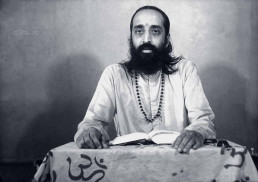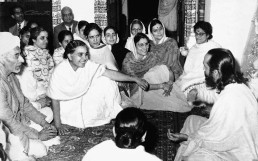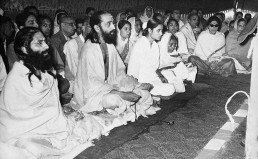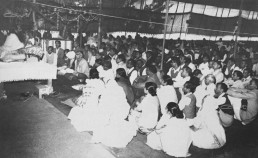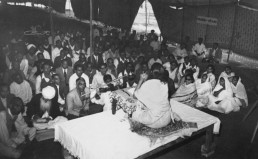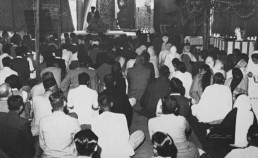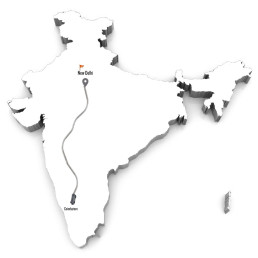
Jnana Yajna 7

Year & Dates:
September 26, 1954 to November 26, 1954

Yajna Topics:
Kathopanishad

Place:
New Delhi, India.
A warm welcome in New Delhi signaled a happy start to Pujya Gurudev Swami Chinmayananda’s seventh Jnana Yajna. The pace during the 61-day discourse series was brisk. Keeping with His unique style of introducing the main Upanishad with a series of preliminary talks, Pujya Gurudev spoke about the “Scientists of Life,” the rishis who studied and analyzed life exhaustively. Particularly in that age of reason over tradition, His preliminary talks gathered the attention of all who went from being simply curious to very committed. His evening discourses on Kathopanishad brought to life the thought-provoking discussion between the young seeker Nachiketa and the God of Death, Dharmaraja, inspiring not just Hindus but also people of varied faiths.
From Preliminary to Profound
It was during the 7th yajna that All India Radio recorded His talks on Religion & Life, Taming the Mind, and Mental Rehabilitation. Pujya Gurudev also taught Vivekachoodamani, Adi Shankara’s great text, during the morning 6:30 to 8:30 am discourses; the book manuscript of His famous commentary was close to being published. The Akanda Kirtan from October 26 to Nov.14, 1954, the Mrtyunjaya Havana from November 9 -14 with an hour’s chanting of the Tryambaka mantra from 8-9 am, and a six day Japa from November 15 – all these infused strength and enthusiasm in hundreds of people. On November 27th, after the Kathopanishad yajna concluded, Pujya Gurudev was invited to bhiksha at the President of India’s Rashtrapati Bhavan. Completing an immersion ceremony of the sacred ashes from the Havana Kund in the waters of Ganga, Haridwar, Pujya Gurudev marched southward, promising Delhi that more would come!
In Admiration
Mobasser, a Jew, while exploring Indian culture and Hinduism, found it initially confusing. He observed a Swami’s English discourses on Kathopanishad happening in Parliament Street, and soon found the jig-saw puzzle of Hinduism come together. He says “Swamiji gave me what I was seeking all round the globe. His universality charmed me; his scientific approach held me spell-bound; his grasp of details filled my hunger to know Hinduism. I discovered in Vedanta the Spirit of Persia. My own Persian Literature became a live-philosophy to me!”
Another devotee Susheela Sharma who considers herself fortunate to have attended the Kathopanishad discourses reminisces, “Gurudev was like the hawker, with utmost patience, brought out mysteries from the basket of KATHA that each evening was an event more thrilling than the movies! It did me good; I got what I wanted right at my doors.
If not for the “Door Delivery”, I would have been completely ignorant of my own Religion like thousands of others. Thank you Swamiji!
Photo Gallery
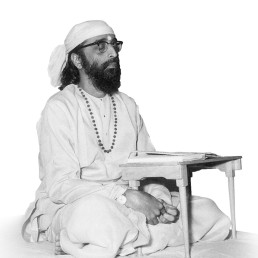
“Think,” Says Pujya Gurudev
This spirit of sacrifice and capacity to find within oneself enough sympathy to serve not only one’s own near and dear relatives but also the whole universe and thus put their Kalyan first, even before one’s own redemption, is one of the most important qualifications unavoidable in a true seeker, if he is to be a total success in his pilgrimage to Truth.
Kathopanishad Vol.1, part 2 p.55
“creation is a motion, a vibration of energy” and that it is possible for the vibration to maintain itself only if there be a motionless and nonvibrating medium, the Absolute Reality. Constant change can certainly give us the delusion of a form ; only there must be a constant medium, for the changes to play in or at least a constant axis upon which they can play. Thus, when a lit up Joss-stick (aggarbati) is rotated fast round the same axis we can detect the joss-stick maintaining itself in the form of a golden circle. The golden circle has no existence except in the consistency of change at the brilliant tip. Similarly, constant vibration of energy in a medium of Absolute Energy, and maintaining itself within the field of a constant axis gives us that ocean of sense objects made up of things and beings.
Kathopanishad Vol.1, part 6 p. 349
Sacred Duties of a Spiritual Seeker
Delve into the spiritual trinity of duties – scripture study, charitable actions, and knowledge-sharing – as we explore the holistic path of a spiritual aspirant. Uncover the profound impact of these duties on spiritual unfoldment, transcending material desires. Watch this striking snippet from Kathopanishad talk series by Pujya Gurudev Swami Chinmayananda given in Toronto, Canada in 1982.
